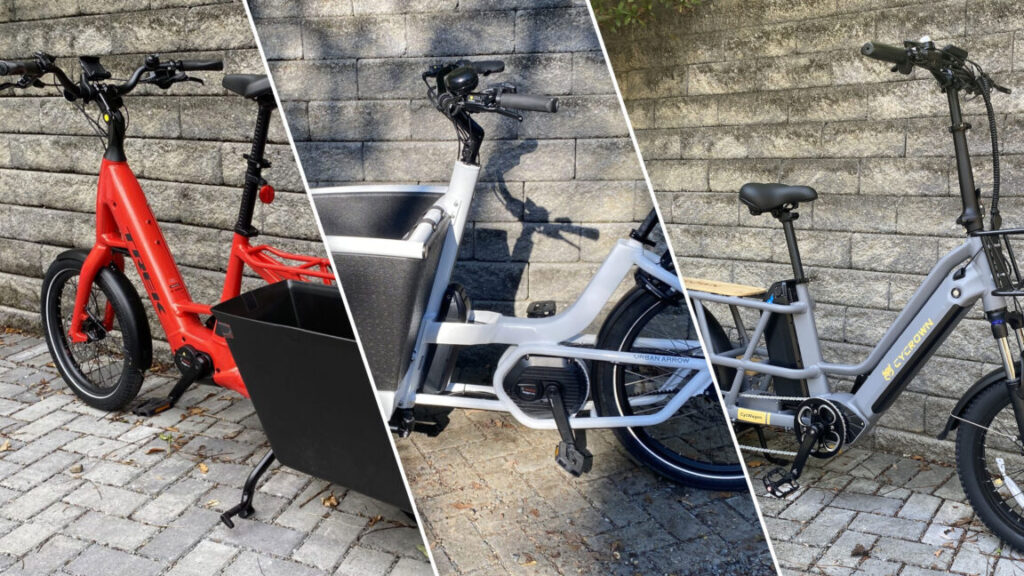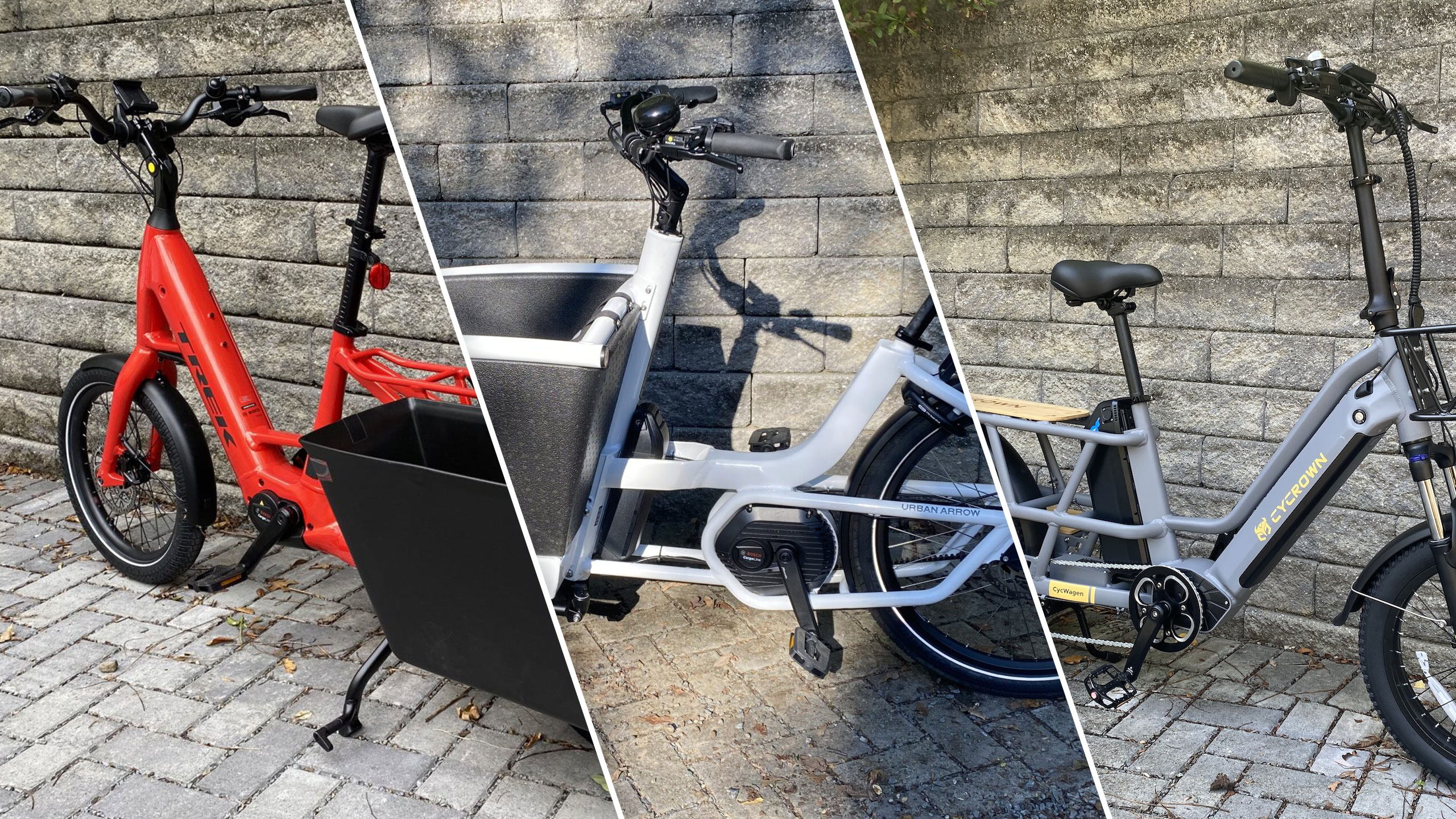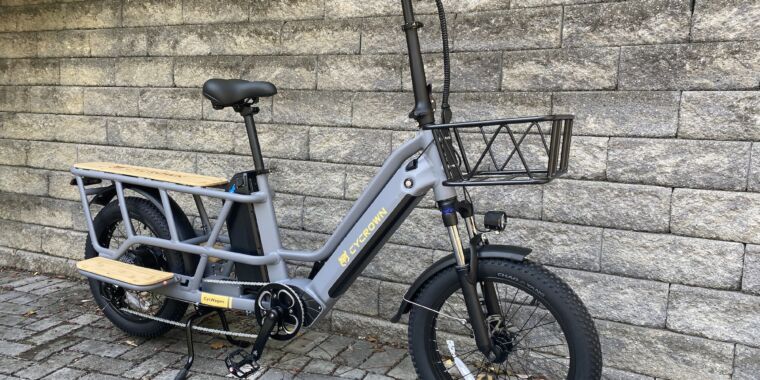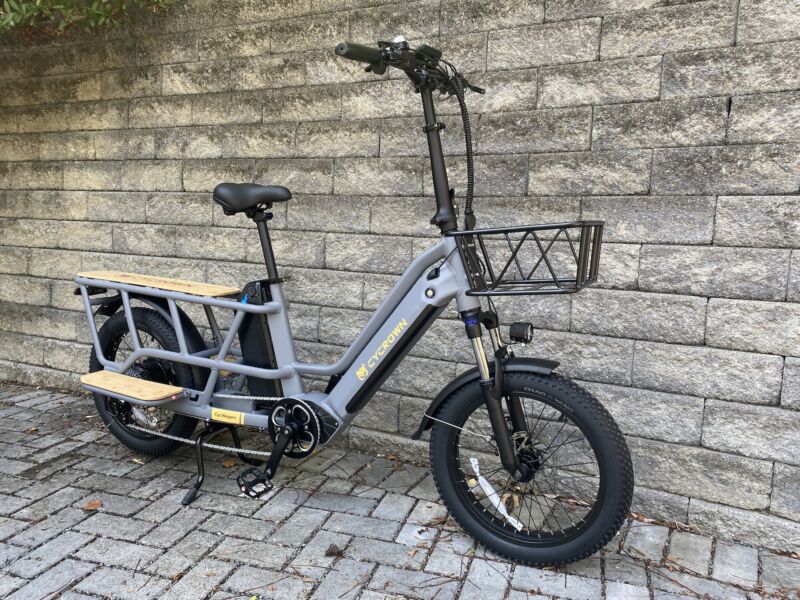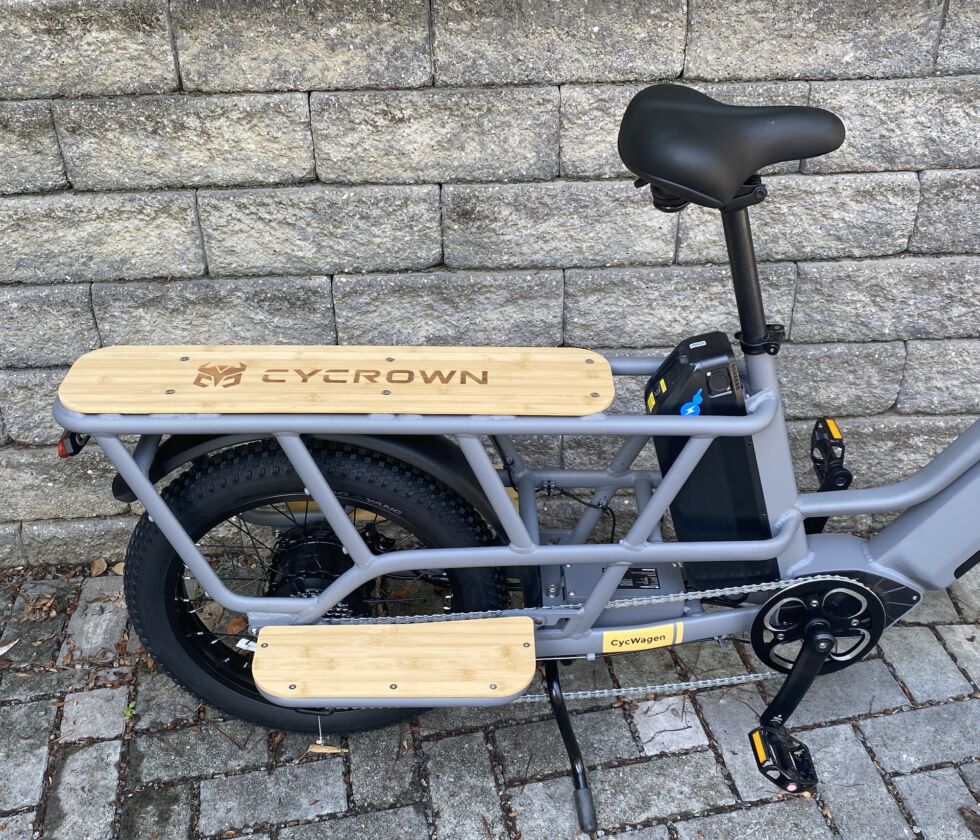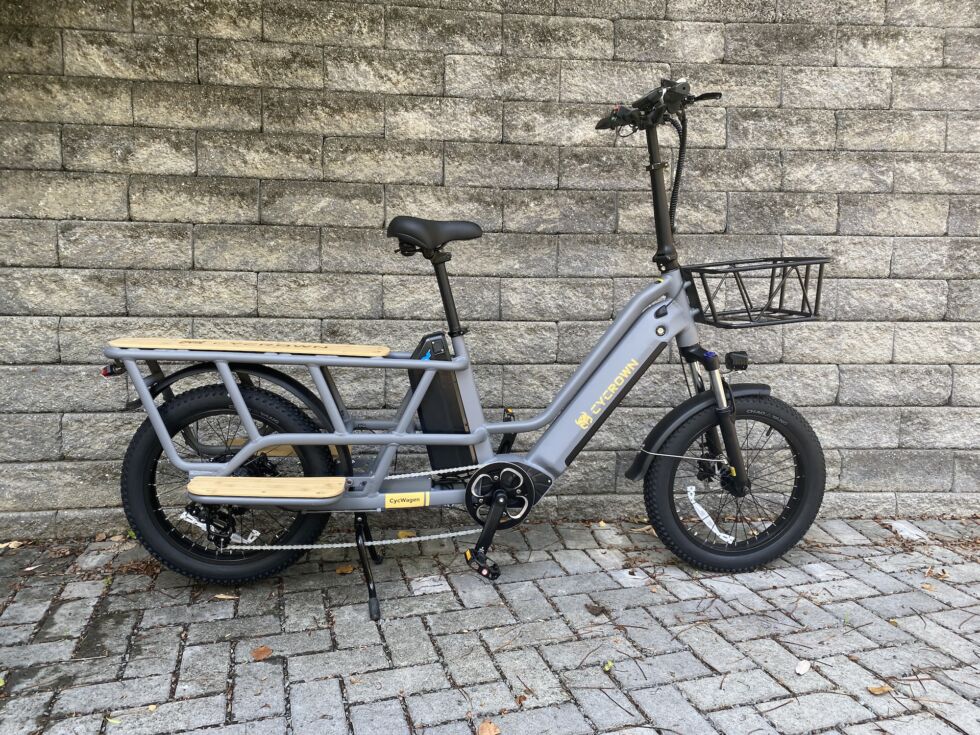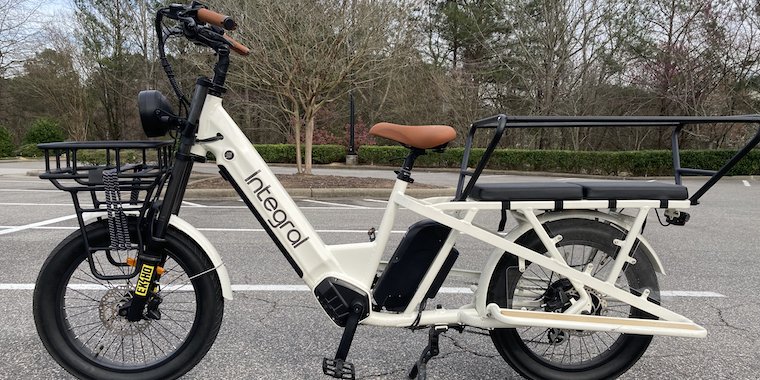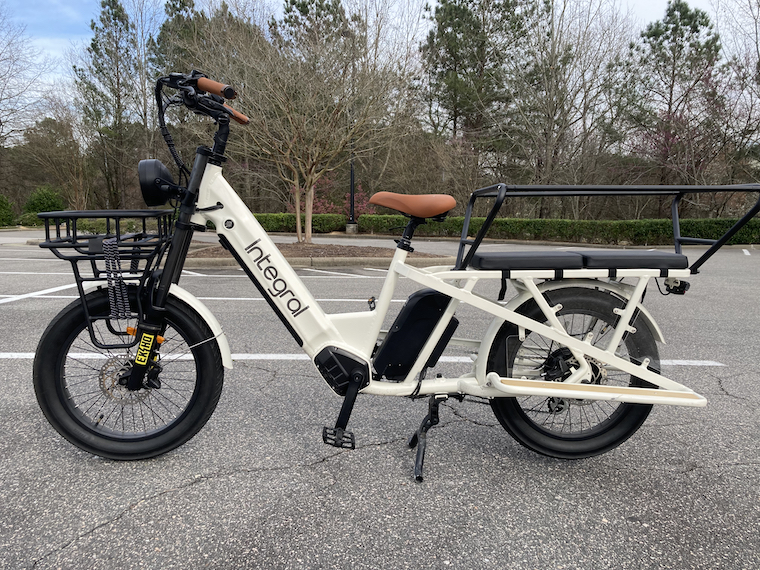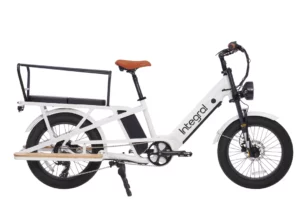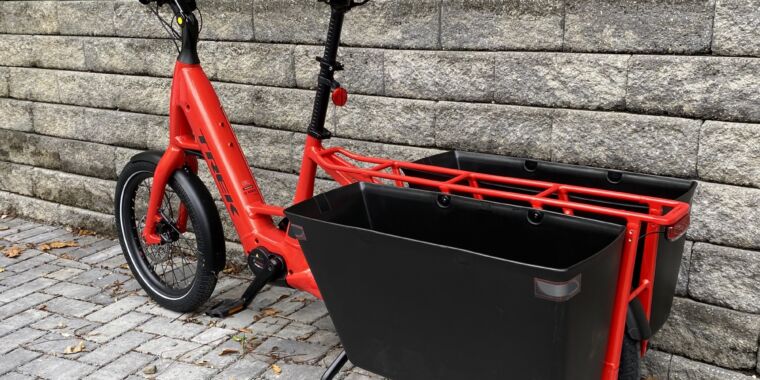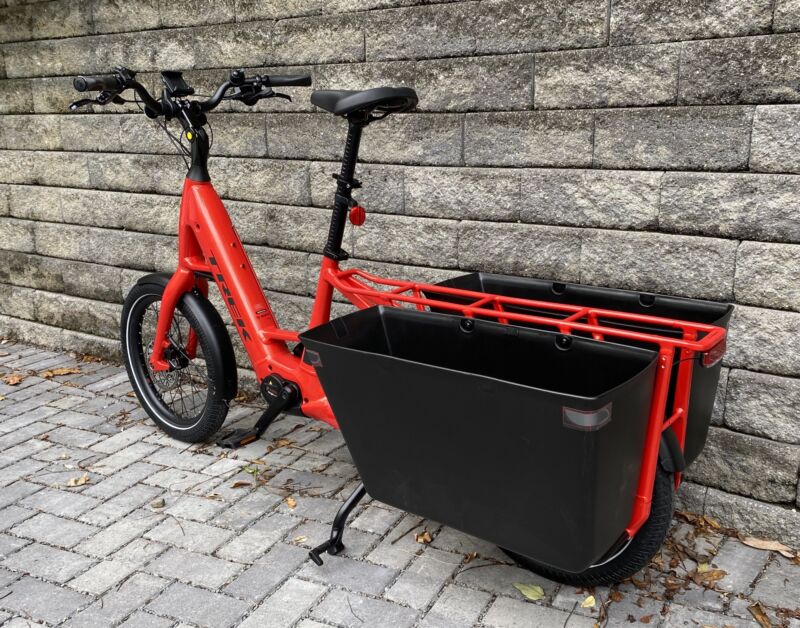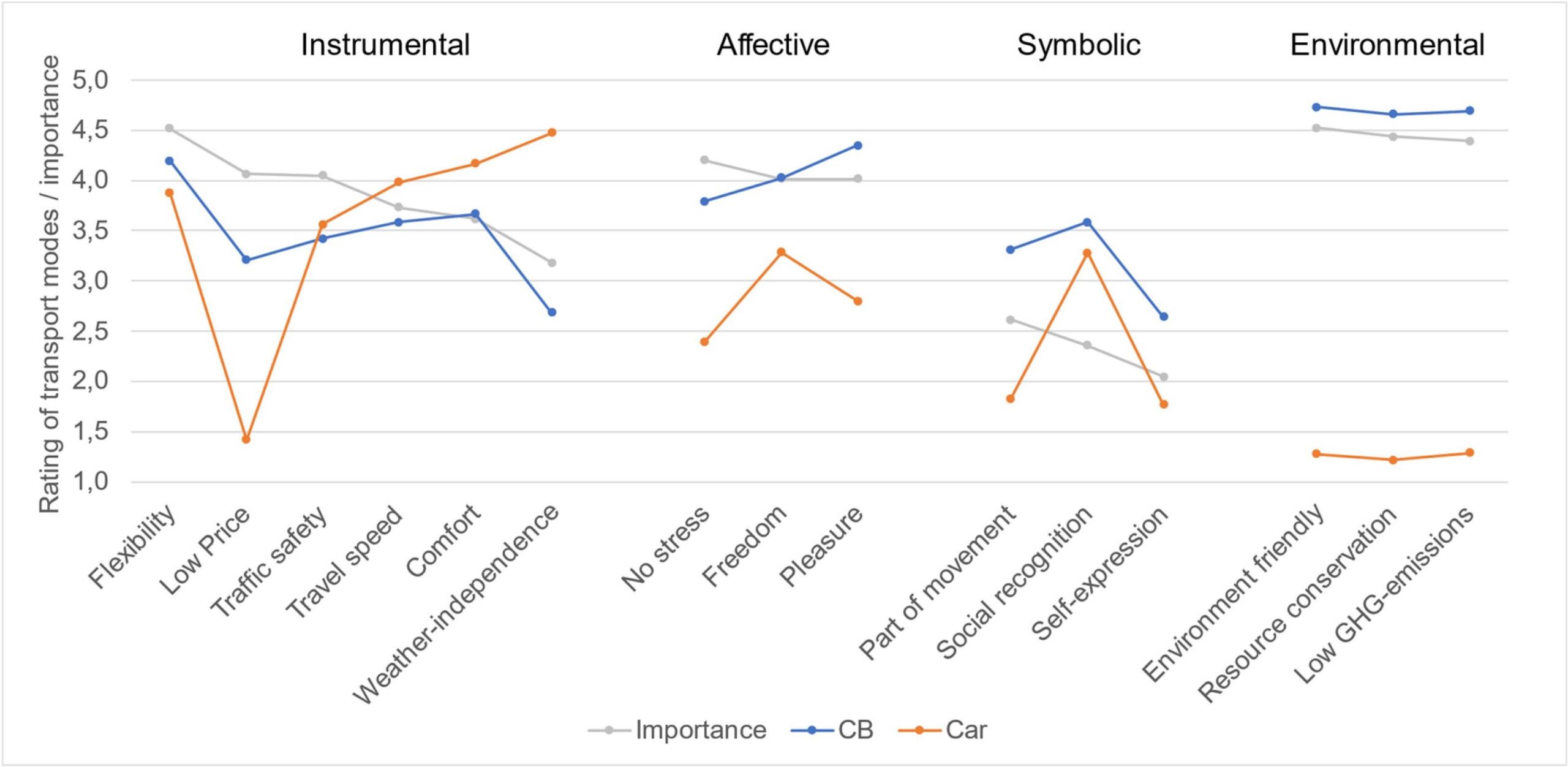The Ars cargo e-bike buying guide for the bike-curious (or serious)
Are you a millennial parent who has made cycling your entire personality but have found it socially unacceptable to abandon your family for six hours on a Saturday? Or are you a bike-curious urban dweller who hasn’t owned a bicycle since middle school? Do you stare at the gridlock on your commute, longing for a bike-based alternative, but curse the errands you need to run on the way home?
I have a solution for you: invest in a cargo bike.
Cargo bikes aren’t for everyone, but they’re great if you enjoy biking and occasionally need to haul more than a bag or basket can carry (including kids and pets). In this guide, we’ll give you some parameters for your search—and provide some good talking points to get a spouse on board.
Bakfiets to the future
As the name suggests, a cargo bike, also known by the Dutch bakfiet, is a bicycle or tricycle designed to haul both people and things. And that loose definition is driving a post-pandemic innovation boom in this curious corner of the cycling world.
My colleagues at Ars have been testing electric cargo bikes for the past few years, and their experiences reflect the state of the market: It’s pretty uneven. There are great, user-centric products being manufactured by brands you may have heard of—and then there are products made as cheaply as possible, using bottom-of-the-barrel parts, to capture customers who are hesitant to drop a car-sized payment on a bike… even if they already own an $8,000 carbon race rocket.
The price range is wide. You can get an acoustic cargo bike for about $2,000, and you start seeing e-bikes at around $2,000 as well, with top-of-the-line bikes going for up to $12,000.
But don’t think of cargo bikes as leisure items. Instead, they can be a legitimate form of transportation that, with the right gear—and an electric drivetrain—can fully integrate into your life. Replacing 80 percent of my in-town car trips with a cargo bike has allowed me to squeeze in a workout while I bring my kid to school and then run errands without worrying about traffic or parking. It means my wife can take our infant daughter somewhere in the car while I take the bigger kid to a park across town.
Additionally, when you buy a car, the purchase is just the start of the costs; you can be stuck with several hundred to several thousand dollars a year in insurance and maintenance. With bikes, even heavy cargo bikes, you’re looking at a yearly check-up on brakes and chain stretch (which should be a $150 bike shop visit if you don’t do it yourself) and a periodic chain lubing (which you should do yourself).
A recent study found that once people use cargo bikes, they like their cars much less.
And, of course, bikes are fun. No matter what, you’re outside with the wind in your face.
Still, like anything else, there are trade-offs to this decision, and a new glut of choices confront consumers as they begin their journey down a potentially pricy rabbit hole. In this article, instead of recommending specific bikes, we’ll tell you what you need to know to make an informed decision based on your personal preferences. In a future article, we’ll look at all the other things you’ll need to get safely from point A to point B.
Function, form, and evolutionary design
Long dominated by three main domains of design, the diversification of the North American cargo bike has accelerated, partially driven by affordable battery systems, interest from sustainability-minded riders, and government subsidies. In general, these three categories—bakfiets, longtails, and trikes—are still king, but there is far more variation within them. That’s due to the entrance of mainstream US bike brands like Specialized, which have joined homegrown specialists such as Rad Power and Yuba, as well as previously hard-to-find Dutch imports from Riese & Müller, Urban Arrow, and Larry vs Harry.
Within the three traditional cargo bikes, each style has evolved to include focused designs that are more or less suitable for individual tasks. Do you live in an apartment and need to cart your kids and not much else? You probably want a mid-tail of some sort. Do you have a garage and an urge to move your kid and a full wheelset from another bike? A Long John is your friend!
Let’s take a high-level look at the options.
Bakfiets/Long Johns
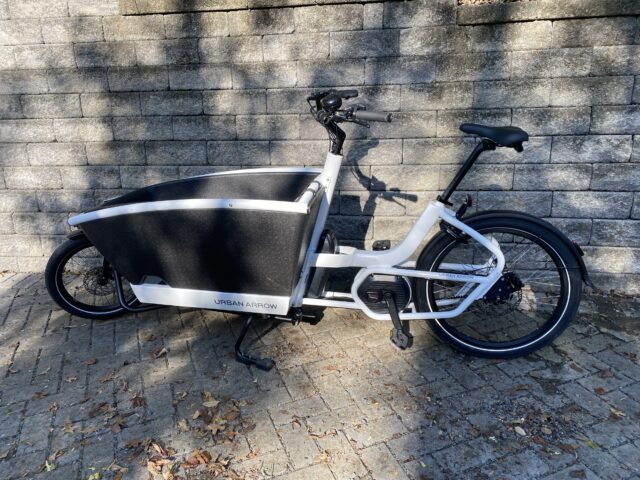
A front-loader from Urban Arrow, called the Family. Credit: John Timmer
Dutch for “box bike,” a bakfiets, or a front-loader, is the most alien-looking of the styles presented here (at least according to the number of questions I get at coffee shops). There are several iterations of the form, but in general, bakfiets feature a big (26-inch) wheel in the back, a large cargo area ahead of the rider, and a smaller (usually 20-inch) wheel ahead of the box, with steering provided through a rod or cable linkage. Depending on the manufacturer, these bikes can skew closer to people carriers (Riese & Müller, Yuba, Xtracycle) or cargo carriers (Larry vs Harry, Omnium). However, even in the case of a bakfiets that is purpose-built for hauling people, leg and shoulder space becomes scarce as your cargo gets older and you begin playing child-limb Jenga.
We reviewed Urban Arrow’s front-loading Family bike here.
Brands to look out for:
- Riese & Müller
- Urban Arrow
- Larry vs Harry
- Yuba
- Xtracycle
Longtails
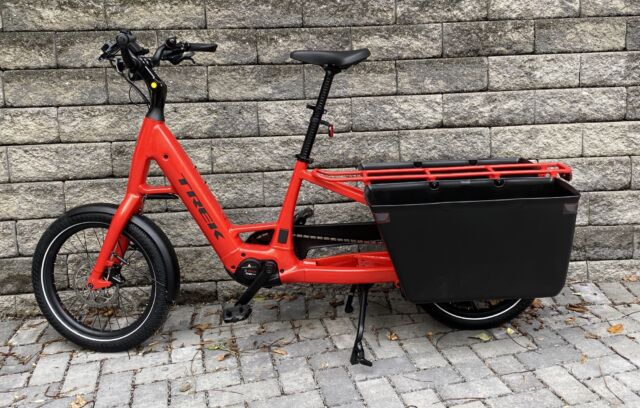
The Trek Fetch+ 2. Credit: John TImmer
If my local preschool drop-off is any indication, long- and mid-tail cargo bikes have taken North America by storm, and for good reason. With a step-through design, smaller wheels, and tight, (relatively) apartment-friendly proportions, long tails are imminently approachable. Built around 20-inch wheels, their center of gravity, and thus the weight of your cargo or pillion, is lower to the ground, making for a more stable ride.
This makes them far less enjoyable to ride than your big-wheeled whip. On the other hand, they’re also more affordable—the priciest models from Tern (the GSD, at $5,000, and the Specialized Haul, at $3,500) top out at half the price of mid-range bakfiets. Proper child restraints attach easily, and one can add boxes and bags for cargo, though they are seen as less versatile than a Long John. On the other hand, it’s far easier to carry an adult or as many children as you feel comfortable shoving on the rear bench than it is to squeeze large kids into the bakfiets.
We’ve reviewed several bikes in this category, including the Trek Fetch+ 2, Integral Electrics Maven, and Cycrown CycWagen.
Brands to look out for:
- Radwagon
- Tern
- Yuba
- Specialized, Trek
Tricycles
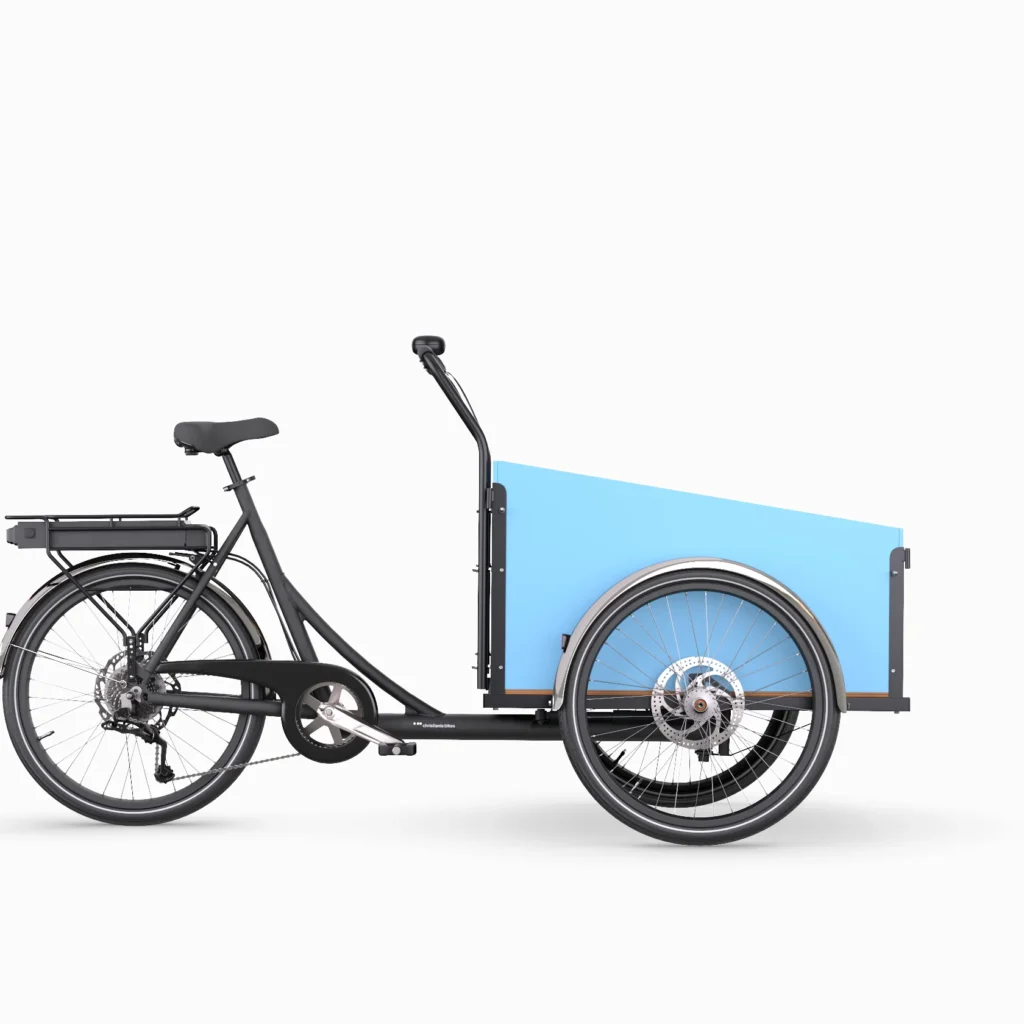
The Christiania Classic. Credit: Christiania Bikes America
And then we have a bit of an outlier. The original delivery bike, trikes can use a front-load or rear-load design, with two wheels always residing under the cargo. In either case, consumer trikes are not well-represented on the street, though brands such as Christiana and Workman have been around for some time.
Why aren’t trikes more popular? According to Kash, the mononymous proprietor of San Francisco’s Warm Planet Bikes, if you’re already a confident cyclist, you’ll likely be put off by the particular handling characteristics of a three-wheeled solution. “While trikes work, [there are] such significant trade-offs that, unless you’re the very small minority of people for whom they absolutely have to have those features specific to trikes, you’re going to try other things,” he told me.
In his experience, riders who find tricycles most useful are usually those who have never learned to ride a bike or those who have balance issues or other disabilities. For these reasons, most of this guide will focus on Long Johns and longtails.
Brands to look out for:
- Christiana
- Worksman
- Babboe
Which bike style is best for you?
Before you start wading into niche cargo bike content on Reddit and YouTube, it’s useful to work through a decision matrix to narrow down what’s important to you. We’ll get you started below. Once you have a vague direction, the next best step is to find a bike shop that either carries or specializes in cargo bikes so you can take some test rides. All mechanical conveyances have their quirks, and quirky bikes are the rule.
Where do you want your cargo (or kid): Fore or aft?
This is the most important question after “which bike looks coolest to you?” and will drive the rest of the decision tree. Anecdotally, I have found that many parents feel more secure having their progeny in the back. Others like having their load in front of them to ensure it’s staying put, or in the case of a human/animal, to be able to communicate with them. Additionally, front-loaders tend to put cargo closer to the ground, thus lowering their center of gravity. Depending on the bike, this can counteract any wonky feel of the ride.

An abridged Costco run: toilet paper, paper towels, snacks, and gin. Credit: Chris Cona
How many people and how much stuff are you carrying?
As noted above, a front-loader will mostly max out at two slim toddlers (though the conventional wisdom is that they’ll age into wanting to ride their own bikes at that point). On the other hand, a longtail can stack as many kids as you can fit until you hit the maximum gross vehicle weight. However, if you’d like to make Costco runs on your bike, a front loader provides an empty platform (or cube, depending on your setup) to shove diapers, paper goods, and cases of beer; the storage on long tails is generally more structured. In both cases, racks can be added aft and fore (respectively) to increase carrying capacity.
What’s your topography like?
Do you live in a relatively flat area? You can probably get away with an acoustic bike and any sort of cargo area you like. Flat and just going to the beach? This is where trikes shine! Load up the kids and umbrellas and toodle on down to the dunes.
On the other hand, if you live among the hills of the Bay Area or the traffic of a major metropolitan area, the particular handling of a box trike could make your ride feel treacherous when you’re descending or attempting to navigate busy traffic. Similarly, if you’re navigating any sort of elevation and planning on carrying anything more than groceries, you’ll want to spring for the e-bike with sufficient gear range to tackle the hills. More on gear ratios later.
Do you have safe storage?
Do you have a place to put this thing? The largest consumer-oriented front loader on the market (the Riese & Müller Load 75) is almost two and a half meters (about nine feet) long, and unless you live in Amsterdam, it should be stored inside—which means covered garage-like parking. On the other end of the spectrum, Tern’s GSD and HSD are significantly shorter and can be stored vertically with their rear rack used as a stand, allowing them to be brought into tighter spaces (though your mileage may vary on apartment living).
If bike storage is your main concern, bikes like the Omnium Mini Max, Riese & Müller’s Carrie, and the to-be-released Gocyle CXi/CX+ are designed specifically for you. In the event of the unthinkable—theft, vandalism, a catastrophic crash—there are several bike-specific insurance carriers (Sundays, Velosurance, etc.) that are affordable and convenient. If you’re dropping the cash on a bike in this price range, insurance is worth getting.
How much do you love tinkering and doing maintenance?
Some bikes are more baked than others. For instance, the Urban Arrow—the Honda Odyssey of the category—uses a one-piece expanded polypropylene cargo area, proprietary cockpit components, and internally geared hubs. Compare that to Larry vs Harry’s Bullitt, which uses standard bike parts and comes with a cargo area that’s a blank space with some bolt holes. OEM cargo box solutions exist, but the Internet is full of very entertaining box, lighting, and retention bodges.
Similar questions pertain to drivetrain options: If you’re used to maintaining a fleet of bikes, you may want to opt for a traditional chain-driven derailleur setup. Have no desire to learn what’s going on down there? Some belt drives have internally geared hubs that aren’t meant to be user-serviceable. So if you know a bit about bikes or are an inveterate tinkerer, there are brands that will better scratch that itch.
A note about direct-to-consumer brands
As Arsians, research and price shopping are ingrained in our bones like scrimshaw, so you’ll likely quickly become familiar with the lower-priced direct-to-consumer (DTC) e-bike brands that will soon be flooding your Instagram ads. DTC pricing will always be more attractive than you’ll find with brands carried at your local bike shop, but buyers should beware.
In many cases, those companies don’t just skimp on brick and mortar; they often use off-brand components—or, in some cases, outdated standards that can be had for pennies on the dollar. By that, I mean seven-speed drivetrains mated to freewheel hubs that are cheap to source for the manufacturer but could seriously limit parts availability for you or your poor mechanic.
And let’s talk about your mechanic. When buying online, you’ll get a box with a bike in various states of disassembly that you’ll need to put together. If you’re new to bike maintenance and assembly, you might envision the process as a bit of Ikeaology that you can get through with a beer and minimal cursing. But if you take a swing through /r/bikemechanics for a professional perspective, you’ll find that these “economically priced bikes” are riddled with outdated and poor-quality components.
And this race to a bottom-tier price point means those parts are often kluged together, leading to an unnecessarily complicated assembly process—and, down the line, repairs that will be far more of a headache than they should be. Buying a bike from your local bike shop generally means a more reliable (or at least mainstream) machine with after-sales support. You’ll get free tune-ups for a set amount of time and someone who can assist you if something feels weird.
Oh yeah, and there are exploding batteries. Chances are good that if a battery is self-immolating, it’s because it’s (a) wired incorrectly, (b) used in a manner not recommended by the manufacturer, or (c) damaged. If a battery is cheap, it’s less likely that the manufacturer sought UL or EU certification, and it’s more likely that the battery will have some janky cells. Your best bet is to stick to the circuits and brands you’ve heard of.

Credit: Chris Cona
Bikes ain’t nothin’ but nuts and bolts, baby
Let’s move on to the actual mechanics of momentum. Most cargo bike manufacturers have carried over three common standards from commuter and touring bikes: chain drives with cable or electronically shifted derailleurs, belt-driven internally geared hubs (IGH), or belt-driven continuously variable hubs (CVH)—all of which are compatible with electric mid-drive motors. The latter two can be grouped together, as consumers are often given the option of “chain or belt,” depending on the brand of bike.
Chain-driven
If you currently ride and regularly maintain a bike, chain-driven drivetrains are the metal-on-metal, gears-and-lube components with which you’re intimately familiar. Acoustic or electric, most bike manufacturers offer a geared drivetrain in something between nine and 12 speeds.
The oft-stated cons of chains, cogs, and derailleurs for commuters and cargo bikers are that one must maintain them with lubricant, chains get dirty, you get dirty, chains wear out, and derailleurs can bend. On the other hand, parts are cheap, and—assuming you’re not doing 100-mile rides on the weekend and you’re keeping an ear out for upsetting sounds—maintaining a bike isn’t a whole lot of work. Plus, if you’re already managing a fleet of conventional bikes, one more to look after won’t kill you.
Belt-driven
Like the alternator on your car or the drivetrain of a fancy motorcycle, bicycles can be propelled by a carbon-reinforced, nylon-tooth belt that travels over metal cogs that run quietly and grease- and maintenance-free. While belts are marginally less efficient at transferring power than chains, a cargo bike is not where you’ll notice the lack of peak wattage. The trade-off for this ease of use is that service can get weird at some point. These belts require a bike to have a split chainstay to install them, and removing the rear wheel to deal with a flat can be cumbersome. As such, belts are great for people who aren’t keen on keeping up with day-to-day maintenance and would prefer a periodic pop-in to a shop for upkeep.
IGH vs. CVH
Internally geared hubs, like those produced by Rohloff, Shimano, and Sturmey Archer, are hilariously neat things to be riding around on a bicycle. Each brand’s implementation is a bit different, but in general, these hubs use two to 14 planetary gears housed within the hub of the rear wheel. Capable of withstanding high-torque applications, these hubs can offer a total overall gear range of 526 percent.
If you’ve ridden a heavy municipal bike share bike in a major US city, chances are good you’ve experienced an internally geared hub. Similar in packaging to an IGH but different in execution, continuously variable hubs function like the transmission in a midrange automobile.
These hubs are “stepless shifting”—you turn the shifter, and power input into the right (drive) side of the hub transfers through a series of balls that allow for infinite gear ratios throughout their range. However, that range is limited to about 380 percent for Enviolo, which is more limited than IGH or even some chain-driven systems. They’re more tolerant of shifting under load, though, and like planetary gears, they can be shifted while stationary (think pre-shifting before taking off at a traffic light).
Neither hub is meant to be user serviceable, so service intervals are lengthy.
Electric bikes
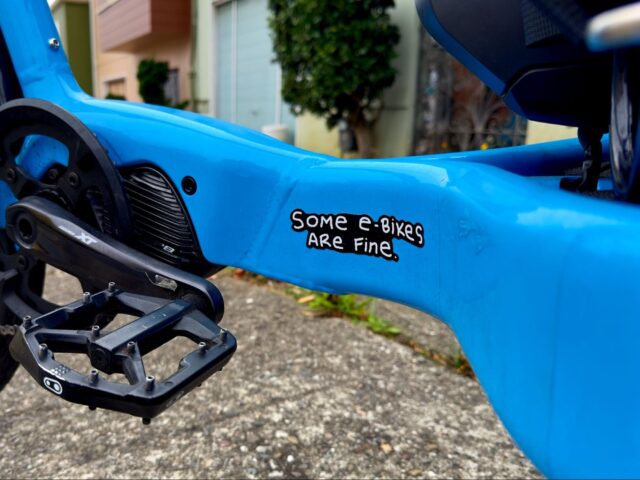
Credit: Chris Cona
Perhaps the single most important innovation that allowed cargo bikes to hit mainstream American last-mile transportation is the addition of an electric drive system. These have been around for a while, but they mostly involved hacking together a bunch of dodgy parts from AliExpress. These days, reputable brands such as Bosch and Shimano have brought their UL- and CE-rated electric drivetrains to mainstream cargo bikes, allowing normal people to jump on a bike and get their kids up a hill.
Before someone complains that “e-bikes aren’t bikes,” it’s important to note that we’re advocating for Class 1 or 3 pedal-assist bikes in this guide. Beyond allowing us to haul stuff, these bikes create greater equity for those of us who love bikes but may need a bit of a hand while riding.
For reference, here’s what those classes mean:
- Class 1: Pedal-assist, no throttle, limited to 20 mph/32 kmh assisted top speed
- Class 2: Pedal-assist, throttle activated, limited to 20 mph/32 kmh assisted top speed
- Class 3: Pedal-assist, no throttle, limited to 28 mph/45 kmh assisted top speed, mandatory speedometer
Let’s return to Kash from his perch on Market Street in San Francisco:
The e-bike allows [enthusiasts] to keep cycling, and I have seen that reflected in the nature of the people who ride by this shop, even just watching the age expand. These aren’t people who bought de facto mopeds—these are people who bought [a pedal-assisted e-bike] because they wanted a bicycle. They didn’t just want to coast; they just need that slight assist so they can continue to do the things they used to do.
And perhaps most importantly, getting more people out of cars and onto bikes creates more advocates for cyclist safety and walkable cities.
But which are the reliable, non-explody standards? We now have many e-bike options, but there are really only two or three you’ll see if you go to a shop: Bosch, Shimano E-Drive, and Specialized (whose motors are designed and built by Brose). Between their Performance and Cargo Line motors, Bosch is by far the most common option of the three. Because bike frames need to be designed for a particular mid-drive unit, it’s rare to get an option of one or another, other than choosing the Performance trim level.
For instance, Urban Arrow offers the choice of Bosch’s Cargo Line (85 nm output) or Performance Line (65 nm), while Larry vs Harry’s eBullitt is equipped with Shimano EP6 or EP8 (both at 85 nm) drives. So in general, if you’re dead set on a particular bike, you’ll be living with the OEM-specced system.
In most cases, you’ll find that OEM offerings stick to pedal-assist mid-drive units—that is, a pedal-assist motor installed where a traditional bottom bracket would be. While hub-based motors push or pull you along by making the cranks easier to turn (while making you feel a bit like you’re on a scooter), mid-drives utilize the mechanical advantage of your bike’s existing gearing to make it easier to pedal and give you more torque options. This is additionally pleasant if you actually like riding bikes. Now you get to ride a bike while knowing you can take on pretty much any topography that comes your way.
Now go ride
That’s all you need to know before walking into a store or trolling the secondary market. Every rider is different, and each brand and design has its own quirks, so it’s important to get out there and ride as many different bikes as you can to get a feel for them for yourself. And if this is your first foray into the wild world of bikes, join us in the next installment of this guide, where we’ll be enumerating all the fun stuff you should buy (or avoid) along with your new whip.
Transportation is a necessity, but bikes are fun. We may as well combine the two to make getting to work and school less of a chore. Enjoy your new, potentially expensive, deeply researchable hobby!
The Ars cargo e-bike buying guide for the bike-curious (or serious) Read More »
